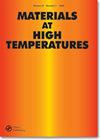ni基合金617显微组织蠕变模拟研究进展
IF 0.9
4区 材料科学
Q4 MATERIALS SCIENCE, MULTIDISCIPLINARY
引用次数: 0
摘要
固溶强化(SSS)镍基高温合金,如A617,在700℃时表现出优异的抗蠕变性能。这些材料在陆基和航空燃气轮机中已经应用多年,现在越来越多地被考虑用于高温火力发电厂。除SSS外,A617的蠕变强度主要来源于γ′和碳化物析出物。在这项工作中,提出了一个基于微观结构的A617蠕变模型。模型中的移动位错与细晶内部沉淀相互作用,晶界作为位错源/汇。该模型能够模拟基于移动位错演化的蠕变曲线和断裂时间图。在较低应力下,在位错蠕变基础上加入扩散蠕变可以提高TTR模型的精度。与文献数据相比,模拟的位错密度的演变是真实的。破坏因子中包含了试样破裂面积的减小,从而考虑了蠕变延性。本文章由计算机程序翻译,如有差异,请以英文原文为准。
Recent progress in the microstructurally based creep modelling of Ni-based alloy 617
Solid solution strengthened (SSS) Ni-based superalloys, such as A617, show superior creep resistance at 700°C. Established for many years in land- and aero-based gas turbines, these materials are increasingly being considered for use in high-temperature thermal power plants. Apart from SSS, the creep strength in A617 stems from γ’ and carbide precipitates. In this work, a microstructurally based creep model for A617 is presented. Mobile dislocations in the model interact with fine grain-interior precipitates, and grain boundaries act as dislocation sources/sinks. The model is capable of simulating creep curves and time-to-rupture (TTR) diagrams based on the evolution of mobile dislocations. At lower stresses, the accuracy of modelled TTR can be improved by adding diffusion creep to dislocation creep. The simulated evolution of dislocation densities is realistic compared to the literature data. The reduction of area of ruptured samples was included in a damage factor, enabling the consideration of creep ductility.
求助全文
通过发布文献求助,成功后即可免费获取论文全文。
去求助
来源期刊

Materials at High Temperatures
工程技术-材料科学:综合
CiteScore
1.90
自引率
15.40%
发文量
58
审稿时长
>12 weeks
期刊介绍:
Materials at High Temperatures welcomes contributions relating to high temperature applications in the energy generation, aerospace, chemical and process industries. The effects of high temperatures and extreme environments on the corrosion and oxidation, fatigue, creep, strength and wear of metallic alloys, ceramics, intermetallics, and refractory and composite materials relative to these industries are covered.
Papers on the modelling of behaviour and life prediction are also welcome, provided these are validated by experimental data and explicitly linked to actual or potential applications. Contributions addressing the needs of designers and engineers (e.g. standards and codes of practice) relative to the areas of interest of this journal also fall within the scope. The term ''high temperatures'' refers to the subsequent temperatures of application and not, for example, to those of processing itself.
Materials at High Temperatures publishes regular thematic issues on topics of current interest. Proposals for issues are welcomed; please contact one of the Editors with details.
 求助内容:
求助内容: 应助结果提醒方式:
应助结果提醒方式:


